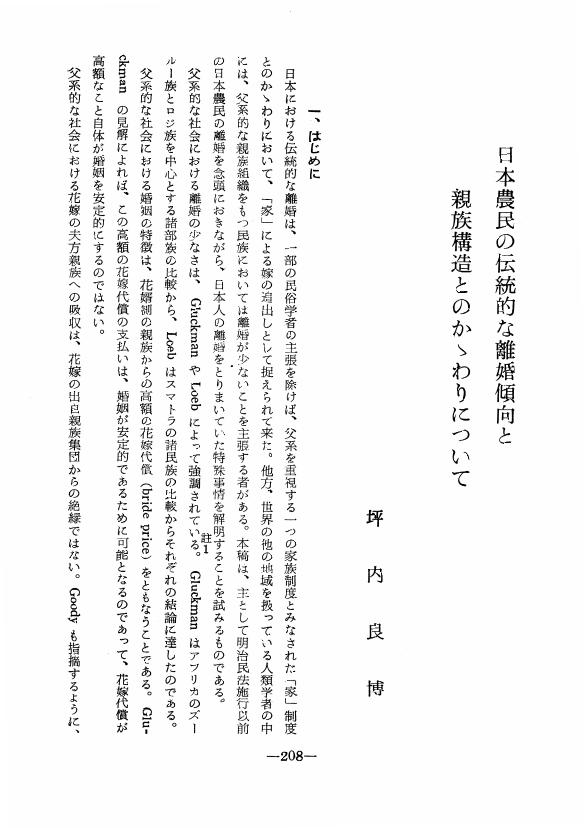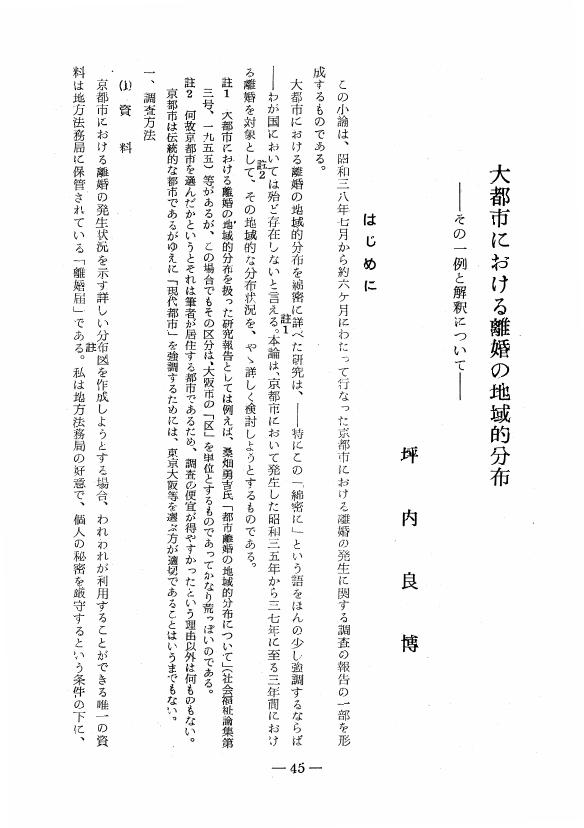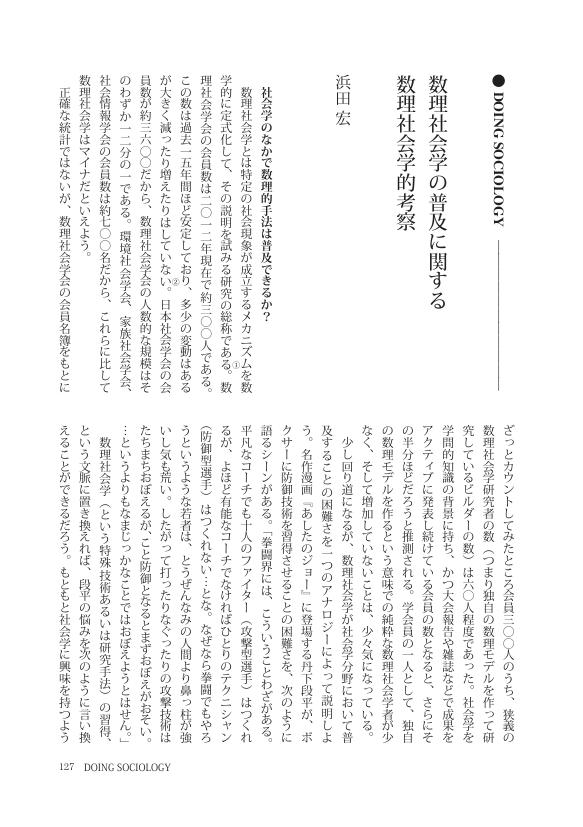1 0 0 0 OA 金泰泳著 『アイデンティティ・ポリティクスを 超えて--在日朝鮮人のエスニシティ』
- 著者
- 山本 かほり 金 泰泳
- 出版者
- 社会学研究会
- 雑誌
- ソシオロジ (ISSN:05841380)
- 巻号頁・発行日
- vol.46, no.3, pp.208-216, 2002-02-28 (Released:2016-11-02)
1 0 0 0 OA M.ブーバーとE.ゴッフマン G.ベイトソンの視角から
- 著者
- 阪本 俊生
- 出版者
- 社会学研究会
- 雑誌
- ソシオロジ (ISSN:05841380)
- 巻号頁・発行日
- vol.33, no.2, pp.77-96,187, 1988-09-30 (Released:2017-02-15)
E.Goffman's argument undoubtedly owes a lot to G.Bateson. Above all, one of Goffman's main concepts 'frame' is obviously inherited from Bateson and used in accordance with his originally intended meaning. Therefore, it will be meaningful to consider Bateson in order to gain a clearer idea of Goffman's viewpoint. Bateson's introduction of the theory of "logical-types" in relation to the study of social communication, which can be considered to be the main point of his 'double-bind theory', is, of course, immediately concerned with 'frame'. And the dynamic property of Goffman's arguement in "Frame Analysis" can be considered in part a product of this Bateson's idea. This paper attempts to make a comparison between the sociology of E.Goffman and that of M.Buber from Bateson's unique point of view. In various aspects, Buber sociology is thought to be the opposite of Goffman's. It is the above mentioned insight of Bateson that can be used here to describe the contrast between these two antipodal scholars. Each of the directions they took is asserted to be correspondent to two principal 'ethoses' of Western society, that is to say, love and skepticism. By examining Buber's ethos of love and Goffman's ethos of skepticism, the significance of the angle that Goffman takes can be reconsidered.
1 0 0 0 アジア的生産様式論について
- 著者
- 岩崎 信彦
- 出版者
- 社会学研究会
- 雑誌
- ソシオロジ (ISSN:05841380)
- 巻号頁・発行日
- vol.15, no.1, pp.105-113, 1969
1 0 0 0 OA 「フレーム」と「関与」 相互作用分析における「コンテクスト」の問題へのゴフマンの視角
- 著者
- 串田 秀也
- 出版者
- 社会学研究会
- 雑誌
- ソシオロジ (ISSN:05841380)
- 巻号頁・発行日
- vol.33, no.2, pp.3-20,190, 1988-09-30 (Released:2017-02-15)
The aim of this paper is to examine Erving Goffman's basic view of "context" in his analysis of face-to-face interaction. The arguments are as follows.(l)According to Goffman, people in "social situation" take up "alignments"each other, which constitute various modes of access to them. Here is his basic view of "context", that is, modes of mutual alignments.(2)In the case of "encounters", mutual alignments are basically taken up in accordance with officially accredited "frames." An official frame has four chief functions in this respect ; l.The exclusive function or the function as a "rule of irrelevance." 2. The function as a "schema of expression and interpretation." 3. The transformative function or the function as a "transformation rule." 4. The organization of "involvement."(3)The basic modes of mutual alignments in accordance with official frames can be changed and differentiated in at least four ways ; a)Allocation of involvement in relation to multiple channels of an encounter. b) "Downkeying" and "upkeying." c) "Fabrication. " d) "Flooding out" in relation to "interation tension."(4)The relationship between an encounter and the social structure can be considered as follows. First, the official frame determines which social-structural factors are officially qualified to guide the encounter. Second, officially excluded social-structural factors "typically" influence the modes of involvement of participants. Hence, social-structural factors influence the stability and vulnerability of an official frame. Here is one of the links between local contexts of interaction and the social structure.
1 0 0 0 OA 林梅著 『中国朝鮮族村落の社会学的研究――自治と権力の相克――』
- 著者
- 足立 重和
- 出版者
- 社会学研究会
- 雑誌
- ソシオロジ (ISSN:05841380)
- 巻号頁・発行日
- vol.62, no.3, pp.73-82, 2018-02-01 (Released:2021-06-04)
1 0 0 0 OA 「セクシュアリティ」概念再考 精神分析の導入に向けて
- 著者
- 古川 直子
- 出版者
- 社会学研究会
- 雑誌
- ソシオロジ (ISSN:05841380)
- 巻号頁・発行日
- vol.54, no.1, pp.19-35,181, 2009-05-31 (Released:2015-05-20)
- 参考文献数
- 19
This article makes an effort to assess the validity and difficulty of the conceptual framework constitutive of today’s gender/sexuality studies, namely the sex-gender-sexuality triad. The theoretical assumptions which underlie current research on gender/sexuality, including feminism, gay/lesbian studies, and queer theory, is characterized by a social constructionist approach. In studies regarding sexuality, beginning in the 1970s, in part because of the publication of Michael Foucault’s influential work “The History of Sexuality” vol.1, social constructionists have argued that human sexuality should not be viewed as a natural fact but as something constructed in historically and culturally specific ways. This led to important theoretical developments, resulting in the analytical separation of gender and sexuality. Nevertheless, the very notion of sexuality remains ambiguous due to the obscure nature of the relationship between sex and sexuality. After reviewing the achievements and problems of current research in this field, the latter part of this article provides a brief introduction to the psychoanalytic view of sexuality, which offers a radical reconceptualization of received notions of what is sexual. Freud’s psychoanalysis has been a major target of constructionist criticism, but an enlargement of the concept of sexuality in psychoanalysis can provide an alternative framework to constructionism in that it disentangles the inextricable knot between sexuality and genitality. Hitherto the fact that Freud defined the sexual without recourse to the genital, and proposed a completely new way of thinking about human sexuality, has received only scant attention. This is to say that psychoanalytic sexuality is defined in opposition to vital or organic functions such as feeding, excretion, respiration, and reproduction, and “sex” is rearticulated through this division of the sexual and non-sexual.
1 0 0 0 OA マルクスにおけるゲマインシャフトとゲゼルシャフト 序説
- 著者
- 岩崎 信彦
- 出版者
- 社会学研究会
- 雑誌
- ソシオロジ (ISSN:05841380)
- 巻号頁・発行日
- vol.17, no.3, pp.49-71, 1972-04-30 (Released:2017-06-14)
1 0 0 0 OA 日本農民の伝統的な離婚傾向と親族構造とのかかわりについて
- 著者
- 坪内 良博
- 出版者
- 社会学研究会
- 雑誌
- ソシオロジ (ISSN:05841380)
- 巻号頁・発行日
- vol.17, no.1-2, pp.208-218, 1971-10-31 (Released:2017-12-09)
1 0 0 0 OA 大都市における離婚の地域的分布 その一例と解釈について
- 著者
- 坪内 良博
- 出版者
- 社会学研究会
- 雑誌
- ソシオロジ (ISSN:05841380)
- 巻号頁・発行日
- vol.12, no.1, pp.45-59, 1965-07-31 (Released:2017-12-28)
1 0 0 0 OA 数理社会学の普及に関する数理社会学的考察
- 著者
- 野村 洋平
- 出版者
- 社会学研究会
- 雑誌
- ソシオロジ (ISSN:05841380)
- 巻号頁・発行日
- vol.51, no.1, pp.3-18,214, 2006-05-31 (Released:2016-03-23)
- 参考文献数
- 27
This article aims to introduce a new idea of "innocence" to the field of child studies, making use of the thoughts of Emmanuel Levinas and Franz Kafka to shed new light on some of the problems faced by both children and adults in the modern society. Conventional child studies fundamentally lack the perspective whereby a child is seen as what Levinas calls "I'autre (I'autrui)." Levinas emphasizes the importance of "face-a-face" with "Vabsolument autre" as distinguished from a relative other, through the sensitivity of "vulnerability." "Innocence" is a form of power which "infini" takes in a society, a "lotalite" which cannot subsume "infini." When "innocence" enters a society, that society cannot understand nor subsume it (because this "innocence" is one attribute of "infini"'). We must use the sensitivity of "vulnerabilite" to perceive "innocence" coming from "infini." Then we will be able to experience a "face-a-face" encounter with "I'autre (I'autrui)" for the first time. One who can perceive "innocence" through "vulnerability" can receive a power from "infini." Such a person can then become an agent who prompts others to experience "trans-socialization," a new dimension beyond socialization. Franz Kafka was one such person who had a special sensitivity of "vulnerabilite." He was extremely sensitive to "innocence," which made him a superior agent for "trans-socialization". Social problems like bullying, hikikomori (withdrawal from society) and child abuse are possibly caused by our failure to become aware of the sensitivity of "vulnerabilite" and the power of "innocence."
1 0 0 0 OA ドイツ中世村落協同体の自治について
- 著者
- 森 正夫
- 出版者
- 社会学研究会
- 雑誌
- ソシオロジ (ISSN:05841380)
- 巻号頁・発行日
- vol.1, no.1, pp.29-45, 1952-01-31 (Released:2019-05-24)
1 0 0 0 OA 依存を通じての統治 ACや共依存に関する言説についての検討
- 著者
- 山家 歩
- 出版者
- 社会学研究会
- 雑誌
- ソシオロジ (ISSN:05841380)
- 巻号頁・発行日
- vol.47, no.3, pp.71-86,178, 2003-02-28 (Released:2016-05-25)
- 被引用文献数
- 1
The aim of this paper is to investigate the roles which the concept of dependency plays in current regime of the self, through articulating self-governance of people, with rationalities and technologies of political power. Nikolas Rose and others argue that, over the last two decades, proliferation of psy-expertise has been intrinsically linked with the emergency of new political rationalities in comtemporary liberal democracies, which they call "advanced liberal government". In this new governmental regime, the articulation of "therapy culture" and "enterprise culture" provide important means to link conduct of the self with the conduct of others. The concept of dependency is often said to be chaotic and is object of controversies among various psy-experts and other experts. However people have increasingly come to understand and act on themselves through the concept of dependency. Problems of dependency are important elements of "therapy culture". In origin, the concept of dependency was understood to be related to alcohol and drugs. Dependents were 'deviant' minorities. But, since 1980's, this concept comes to have connection to many other objects. Today, dependents are regard to be dependent on not only substances but also various objects, actions, and processes, like sports, sex, shopping, eating , gambling, love, computer, etc.. The experts of dependencies emphasize that everyone can be pathological dependents. This transformation of the concept extend the fields of intervention of psy-expertises. Our exercises of freedom come to be problematized in termes of dependency. When one is dependent, he can not be thought to exercise his freedom in proper way. Psy-experts insist that to recover from the state of dependency, they need to recover from all sorts of dependeicies. This concept enable psy-experts to intervene everyday practices of lay people to shape them as free-rensponsible subjects of choice.
- 著者
- 立石 裕二
- 出版者
- 社会学研究会
- 雑誌
- ソシオロジ (ISSN:05841380)
- 巻号頁・発行日
- vol.52, no.1, pp.103-118,154, 2007-05-31 (Released:2016-03-23)
- 参考文献数
- 36
This paper deals with the case of the Nagara River Estuary Barrage in Japan and examines how the scientific sector interacts with the government sector and the movement sector in society and affects the social process of the problem. In this problem, the government justified the construction of the barrage based on river engineering, while environmental movements opposed it based on the results of ecological research. Here we can observe a disparity in the academic disciplines that the government and the movement pursued. When the government intends to investigate a scientific topic, it sets up a commission of scientists. Whereas, when an environmental movement intends to investigate, it seeks to establish a network of critical scientists who hold opposing views. The interactions of scientists in an academic discipline with society vary according to whether the discipline has scientific autonomy and whether the government and the movement intend to promote further investigation. It was found that both the government and the movement intended to investigate the limnology, and the research results of both entities affected the government policy institutionally, ideologically, the movement sector actively conducted research, the results of which had an influence on the government policy via public opinion; the government, on the other hand, was not eager to investigate. The interaction within a new discipline arises without institution and subsequently changes into the institutional form. Any institutionalized discipline, however, cannot represent the purpose of the movement completely, and there always remain issues related to uninstitutionalized disciplines. In river engineering, the movement sector was unable to establish a network of critical scientists because the government and scientists had a strong connection. In public economics, the scientific framework for the discussion was under construction at that time. In such cases, social conflicts do not lead to the progress of scientific investigation.
1 0 0 0 罪責感とその軽減:「水子供養」調査から
- 著者
- 高橋 由典
- 出版者
- 社会学研究会
- 雑誌
- ソシオロジ (ISSN:05841380)
- 巻号頁・発行日
- vol.32, no.1, pp.93-97, 1987
1 0 0 0 渋谷望著 『魂の労働--ネオリベラリズムの権力論』
- 著者
- 重田 園江 渋谷 望
- 出版者
- 社会学研究会
- 雑誌
- ソシオロジ (ISSN:05841380)
- 巻号頁・発行日
- vol.49, no.2, pp.138-144, 2004
1 0 0 0 小林多寿子著 『物語られる「人生」--自分史を書くということ』
- 著者
- 谷 富夫 小林 多寿子
- 出版者
- 社会学研究会
- 雑誌
- ソシオロジ (ISSN:05841380)
- 巻号頁・発行日
- vol.43, no.1, pp.157-165, 1998
- 著者
- 片桐 雅隆 佐藤 嘉一
- 出版者
- 社会学研究会
- 雑誌
- ソシオロジ (ISSN:05841380)
- 巻号頁・発行日
- vol.50, no.1, pp.146-154, 2005
- 著者
- 佐藤 令奈
- 出版者
- 社会学研究会
- 雑誌
- ソシオロジ (ISSN:05841380)
- 巻号頁・発行日
- vol.58, no.1, pp.19-34,185, 2013
This study clarifies how the problem of atopic dermatitis in Japan developed criticism of modernity or modern medicine using discourse analysis of mass media and discussing the consequences and significance of this criticism. Atopic dermatitis initially emerged as an illness with causes attributed to modern lifestyles and was commonly referred to as a 'civilization disease. 'Although difficult to treat, many treatments recommended diet control for patients. Conversely, citing risks associated with diet control, some physicians recommended pharmacological treatment, in particular, the use of corticosteroids. However, pharmacological treatments were criticized since they present the risk of side effects. Consequently, patients developed critical views toward modern medicine from the viewpoints of lack of informed consent and the adequacy of using corticosteroids. Physicians countered this criticism against modern medicine by advocating "discussion of atopic dermatitis as a medical business", which is a discussion of the confidence trick against the patients of atopic dermatitis and prepared the standard treatment. Recently, patients seem to be accepting the physicians' claims. It is evident from this discussion that the criticism of modern medicine in the context of the physician–patient relationship, like the lack of informed consent or interventional pharmacological treatments, is losing effectiveness. Now is the time for proper criticism of modern medicine in order to restructure its effectiveness by revising the significance of the self-transformation of the modern physician.
- 著者
- 真鍋 祐子 小笠原 真
- 出版者
- 社会学研究会
- 雑誌
- ソシオロジ (ISSN:05841380)
- 巻号頁・発行日
- vol.35, no.2, pp.143-158, 1990






